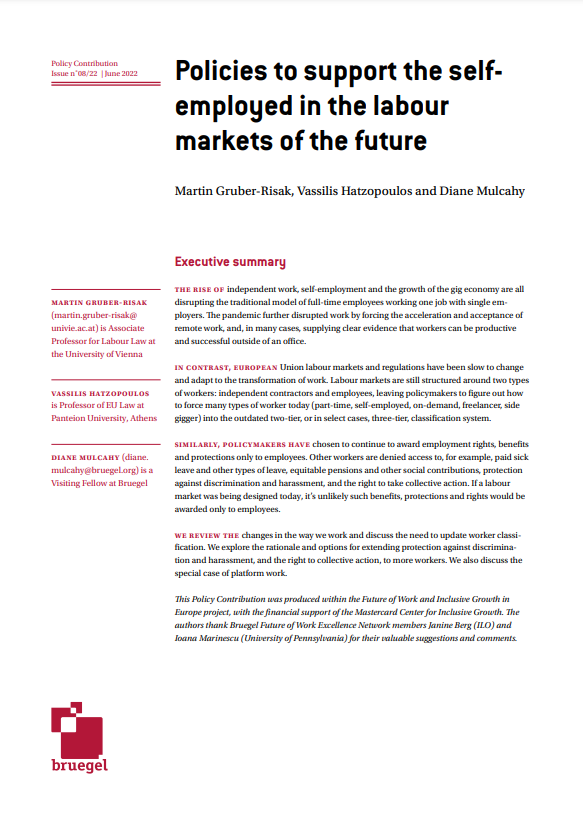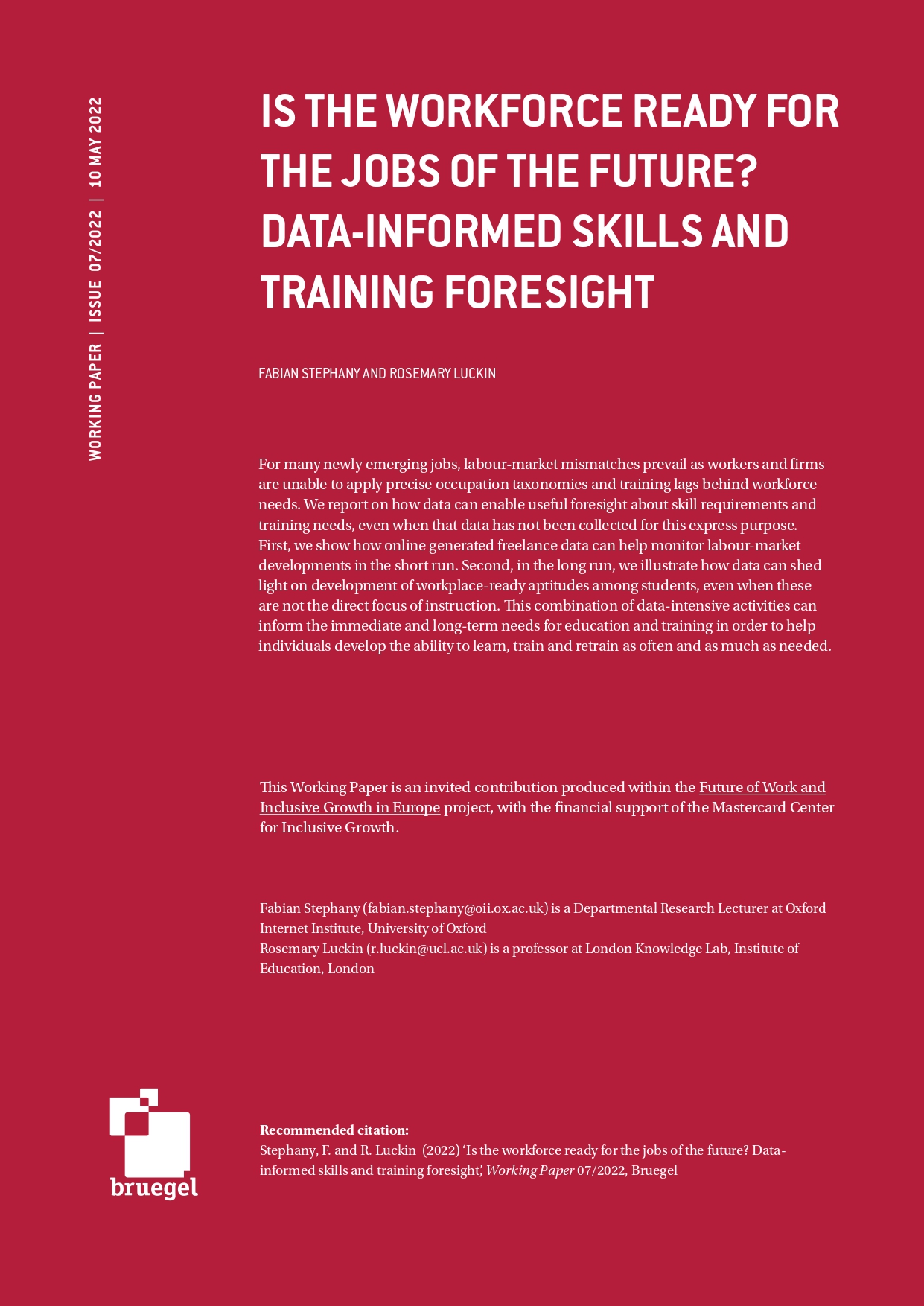Blog Post
Self-employment, COVID-19, and the future of work for knowledge workers
The experiences of the self-employed could give a glimpse into the future of work for knowledge workers in a post-pandemic world.
COVID-19 and the resulting lockdowns and work-from-home orders have forced businesses and employees to rethink existing working modes. Advances in information and communications technologies have allowed many knowledge workers to switch to home-based teleworking overnight, especially in the developed world. In Europe, the percentage of teleworkers increased from 5% in 2019 to 40% in 2020. Although many countries are now vaccinating against COVID-19, the world is unlikely to return to normal quickly. As such, teleworking for many middle- and high-skilled workers will likely persist as part of the future’s hybrid work mode.
In many ways, increased teleworking because of COVID-19 has made the working conditions of knowledge workers (those predominantly working at a computer) similar to those of the self-employed. A better understanding of how the traditional self-employed—business owners with or without other employees—organise their work and harness the benefits of autonomy and flexibility while managing their job demands can offer insights to policymakers, employers and employees on the changing work domain more generally and the labour market consequences of COVID-19 more specifically.
The self-employed have higher job satisfaction levels than salaried employees, even after accounting for differences, such as age, gender, working hours and salary (Figure 1). The self-employed in the European Union are about 4 percentage points more satisfied with their overall working conditions than employees. However, the pattern is not uniform, and in several countries, there is no job satisfaction difference between the two groups.
Of course, the self-employed and salaried workers might differ in their characteristics, such as motivation, ability or entrepreneurial aptitude. But even when these factors are taken into account, switching from a salaried job to self-employment leads to significant short-run gains in job satisfaction (Figure 2), which may persist five years after switching.
Yet, having your own business brings many challenges. The self-employed have non-standard career paths, conflicting job demands, work longer hours and, in the lower parts of the wage distribution, earn less than comparable salaried workers. They also face time pressure, uncertainty, role ambiguity, and loneliness, which can lead to stress. How do they have this job satisfaction advantage then and what might it imply for teleworkers and the future of work?
Figure 1: Predicted probability of reporting job satisfaction, by self-employment status and country
Figure 2: Job satisfaction consequences of switching from salaried employment to self-employment vs. remaining salaried employed in Germany, 1991-2017
Despite the high job demands, business owners also have high job control and autonomy over their tasks. This independent way of working gives rise to “procedural utility,” ie, the enjoyment of the process as well as the outcome of working while avoiding hierarchy and subordination. This unique combination of high job demands but also high job control gives rise to “active jobs,” a state when work leads to self-actualisation, mastery, new skill development and ultimately greater well-being. In fact, job control completely cushions the stress aspects of self-employment.
Like self-employment, teleworking comes with many challenges and job demands. It may result in longer working hours and increased responsibilities, more distractions, conflicting priorities, and loneliness because of less socialisation with colleagues. The relationships individuals have at work are not only crucial for the flow of information but are also essential for workers’ well-being.
Yet, teleworking also provides freedoms and self-organisation, which may help create “active jobs” for knowledge workers working for an employer. For example, those who work from home can often flexibly decide their working hours or take breaks to accommodate household chores or other obligations. This increased freedom and autonomy, may boost productivity. Also, given that commuting is the least enjoyable part of people’s day, the reduced need to travel to work may increase happiness, which in turn can make workers more productive. Unsurprisingly, salaried workers value working from home. In the United States, they are even willing to take an 8% salary cut in exchange for this opportunity and the flexibility it brings. Like with the self-employed, the autonomy and freedom due to teleworking can outweigh the stress associated with it and ultimately durably shape preferences for teleworking. In Europe, about four in five respondents indicated that they would like to work from home, even after the pandemic is over. While only 13% wanted to telework daily, about a third said they would like to use their home office several times a week. Moreover, the more workers used their “home office,” the more likely they were to prefer to work from home, implying overall positive experiences with teleworking.
Against this backdrop, employers may need to make additional provisions to support teleworkers in a post-pandemic world. First, firms may need to invest in additional ICT resources or training to accommodate their employee’s changing needs. In some European countries, more than half of current teleworkers are in this role for the first time, implying that they may be lacking the necessary equipment or skills required for working from home. Second, employers may have to specify the options and conditions for voluntary teleworking in the future, including the tasks they would like to be done remotely, and the opportunities of coming to the office and socialising with co-workers. Finally, managers may have to tailor their approach to the needs of individual workers, for example, by initiating more direct personal contact via phone or video-chat and monitoring subordinates’ well-being.
Governments can play an important role, too. The continuous supply of childcare services and educational activities can support working parents, especially women, with balancing work and caregiving or home-schooling duties. In some cases, free childcare or additional paid leave for parents when schools or kindergarten are closed may be an option. In addition, policymakers can focus on modifying labour laws to outline the conditions for requesting to telework or hybrid working and ensure equal pay for teleworkers and office workers.
These policies will help harness the benefits of autonomy, flexibility and self-organisation that come with teleworking or hybrid working modes and mitigate the stress, burnout, isolation, or unfair treatment that may accompany working from home.
This blog was produced within the project “Future of Work and Inclusive Growth in Europe“, with the financial support of the Mastercard Center for Inclusive Growth.
Recommended citation:
Nikolova, M. (2021) ‘Self-employment, COVID-19, and the future of work for knowledge workers’ Bruegel Blog, 4 March
Republishing and referencing
Bruegel considers itself a public good and takes no institutional standpoint. Anyone is free to republish and/or quote this post without prior consent. Please provide a full reference, clearly stating Bruegel and the relevant author as the source, and include a prominent hyperlink to the original post.






